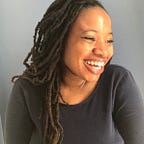A Journey of Self-Discovery
By Vanessa Iwuoha for The Leadership Journal (p. 68)
I was lost. I was whoever they wanted me to be until I couldn’t. When I was in kindergarten, if you asked me where I’m from, I’d proudly say, “Niger,” because it looked a lot like “Nigeria,” and I couldn’t tell the difference. Nevertheless, I was excited to tell how we came when I was three and share stories of home only my mom remembered.
Then middle school came. Being dark-skinned meant you were African, and there was something terrible about that. I’m not dark-skinned, so I was in the clear. But looking around, I knew I was different. Something wasn’t right. I wasn’t like them. In 6th grade, I finally knew what was wrong with me. My nose was a disfigured blob in the middle of my face. My favorite part of my face, I grew to hate the most: my lips.
Classmates said, “You got DSL.”
I won’t tell you what that means, but I hated my reflection because of it. I was a blank page, floating in the middle of me and who I should be.
At school, I sat through the torture of the African butt-scratcher jokes. My mind was filled with laughter, anything to distance myself from the jokes. Anything to remind me I wasn’t African. To survive, when people would ask me where I’m from, I’d answer with, “Where do you think?”
To some, I was Jamaican; to others, I was mixed. To everyone, I was anyone but me, and that was all that mattered.
But it was hard. I wasn’t them. I didn’t get why their tales of “home” didn’t sound like mine, why our dinners weren’t the same, why I talked differently. So, I watched, I took notes, and I copied.
In 7th grade, I found out I’d be going to a new school. I could start over. I restocked my closet, made more observations, and learned.
It didn’t work. I wasn’t enough. Some saw right through me. To the few who asked, “Are you African?” I shook my head no. That word held shame and self-hate; I wanted nothing to do with it. They’d sigh in relief. I’d exhale. I was safe.
The differences became glaring, our cultures weren’t the same. I’m falling at the seams, filling my mind with lies, anything to be a part of them.
Finally, in high school, for the first time, I meet Nigerians who weren’t family. My heart sank. I wasn’t Nigerian enough. But I’m not African American. I’m just here floating in the in-between. However, it’s a big first step.
I’d love to say there was a moment it all hit me, where imaginary light bulbs flickered brightly, and gears started to turn, but it wasn’t like that.
It was a slow, painful acceptance: I could only be me. That thought first frightened me: it was a condemnation that I’d be forever trapped in this body.
Slowly, it washed into “this is me; this is who I’ll always be.” No excitement, no dread at the thought, just simply taking in that truth. Then my breathing slowed, the weight of the hateful words and poisonous thoughts echoing through my brain became less important. I realized I had the power.
As long as I tied my value to how I look or where I’m from, I’d never be enough. Not to anyone nor myself. I couldn’t make myself more American or more Nigerian. I could only accept me. This is the only me I’d ever get, and how could I hate it when it felt like everyone else did too.
Who would show me kindness if I couldn’t show it to myself? And then my eyes glowed, my lips curving into a smile, as I thought, “This is me.”
A step away from years of self-hate, one towards self-discovery, walking the road to self-love; it’s been tough, but if you ask me where I’m from, I’ll say “Nigeria.”
The Leadership Journal is a youth-authored publication by Butterfly Dreamz, Inc. To learn more and support our work, visit butterflydreamz.org/books.
